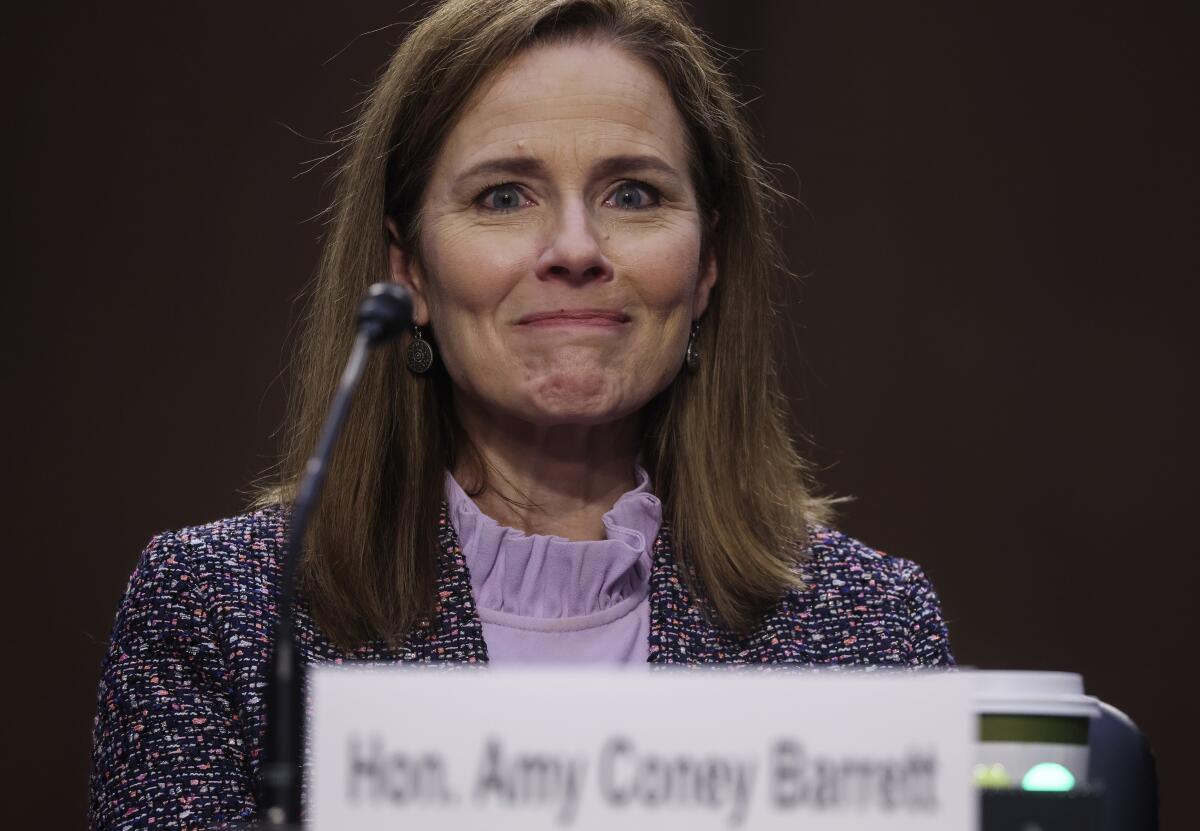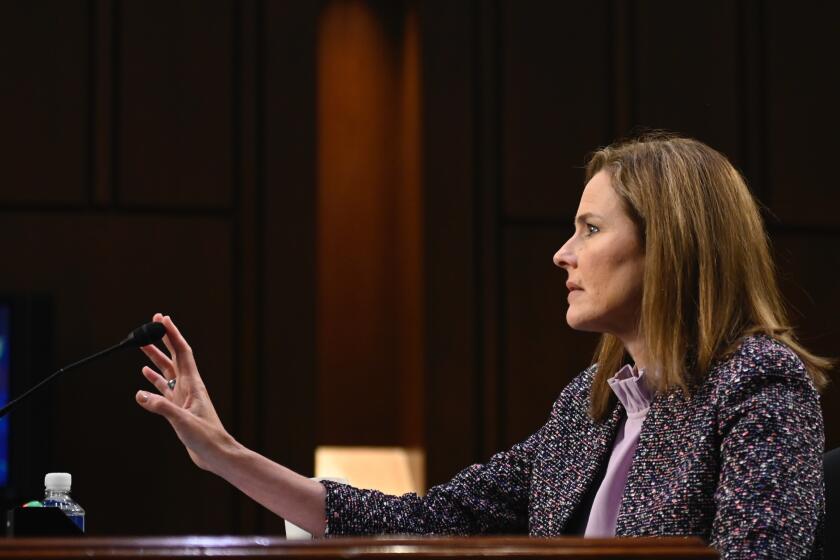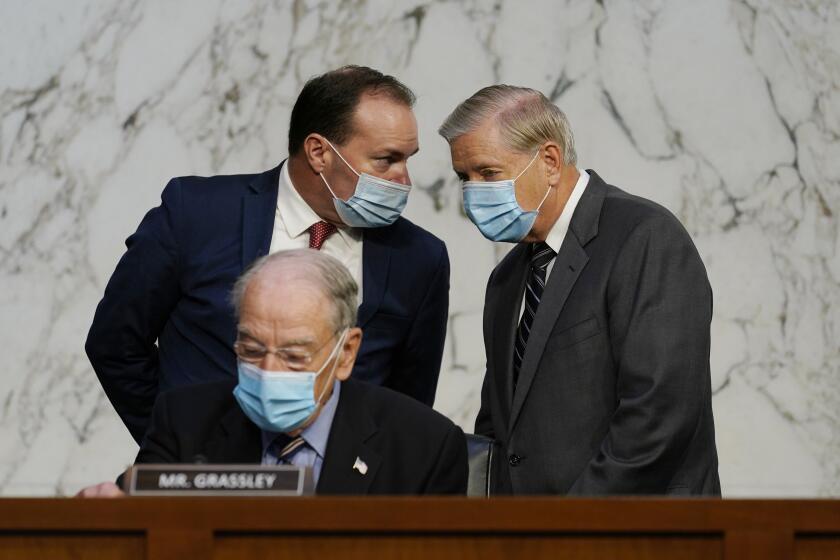Calm and controlled, Barrett shows in hearing why conservatives bet she’ll reshape Supreme Court

- Share via
WASHINGTON — Judge Amy Coney Barrett, President Trump’s Supreme Court nominee, showed why she has been a favorite of social conservatives and how she will be a formidable figure on a court expected to move toward restricting a woman’s access to abortion and strengthening religious liberty and gun rights.
Over two days of questioning before the Senate Judiciary Committee, Barrett was calm, poised and in full control throughout, often playing the role of the law professor explaining doctrines such as severability, standing and stare decisis.
Confirmation hearings for Supreme Court nominees can be grueling and painful. Justice Brett M. Kavanaugh survived his two years ago, but he was left angry, scowling and embittered while denying allegations that he had drunkenly assaulted a girl when he was in high school.
Barrett’s hearing was a study in contrast. She politely fended off questions from frustrated Democrats who asked her to discuss her views on the issues that divide the high court. She assured senators she aspired to be a judge, not a policymaker. But they came away with no reason to doubt that she will join a 6-3 conservative majority that could stand in the way of a Democratic Congress or future Democratic presidents.
Those who watched her testimony were left to reconcile two contrasting portraits of Barrett. She presented herself as an antiabortion, Catholic conservative and a restrained and neutral judge who would bring “no agenda” to the court.
The conservative judge has batted away questions in long and lively exchanges, insisting she would bring no personal agenda to the court.
“This is the first time in American history that we’ve nominated a woman who’s unashamedly pro-life,” Sen. Lindsey Graham (R-S.C.), the Judiciary Committee chairman, said Wednesday. She is “a practicing Catholic ... who embraces her faith without apology.”
Barrett described herself as “an originalist” who would follow the approach taken by her former boss, Justice Antonin Scalia. He insisted over nearly 30 years on the court that the Roe vs. Wade decision was wrong and should be overturned. No one in 1868 would have understood the newly ratified 14th Amendment and its right to “liberty” as invalidating state laws against abortion, he argued.
In refusing to discuss how she would view the right to abortion, Barrett — who in 2013 signed a public letter calling for “the unborn to be protected in law”— said she was following the example of the woman whose seat she would fill, Justice Ruth Bader Ginsburg, who said in her hearing she would not make predictions.
In 1993, however, Ginsburg told senators she believed women, not the government, should decide on abortion. “The decision whether or not to bear a child is central to a woman’s life,” she said. “It’s a decision that she must make for herself.”
Sen. Amy Klobuchar (D-Minn.) called Barrett the “polar opposite” of Ginsburg on a host of issues.
Ginsburg’s death last month cleared the way for Trump to appoint his third justice and shore up the court’s conservative majority.
Chief Justice John G. Roberts Jr. is a conservative, but this year he joined with Ginsburg and three other liberal justices to maintain the court’s precedents on abortion. Before that, he twice provided the vote to uphold the Affordable Care Act against conservative legal challenges.
Over the last year, Roberts positioned himself as a powerful swing vote, but that will probably end if Barrett is confirmed as expected, because his vote will not be as vital.
Barrett repeatedly said her “personal views” and her religion would play no role in her decisions. “I do see as distinct my personal and moral religious views, and my task of applying laws as a judge,” she said Wednesday.
That test could come soon.
With balloting well underway in the Nov. 3 election, Republicans downplay the idea that the Supreme Court would wipe out the Affordable Care Act, fearing a voter backlash.
This week, the justices have before them an appeal from Mississippi in which the state seeks to enforce a new law banning abortions after 15 weeks of a pregnancy. In Dobbs vs. Jackson Women’s Health Organization, the state urges the high court to reconsider its rule that abortions may not be banned until the point that a fetus can live on its own. The justices could act on the appeal soon or wait until a new ninth justice joins them.
At least a dozen other Republican-led states have enacted stricter abortion laws that are designed to challenge Roe vs. Wade before a conservative high court.
For their part, the committee’s Democrats were unusually restrained. Unlike with Kavanaugh, they did not press her with harsh or scornful questions, and they avoided any comments that could be replayed as an attack on her religious faith. Sen. Dianne Feinstein (D-Calif.) joined with many of the Republicans by opening her questioning by warmly praising Barrett’s large family who sat behind her throughout the hearing.
But Democrats highlighted her potential effect on an already conservative court.
Sen. Richard J. Durbin (D-Ill.) pointed to a Barrett opinion that argued the Constitution’s protections for guns rights are stronger than for voting rights, at least for those with a felony in their past.
Last year, Barrett wrote a 37-page dissent in the case of what Durbin referred to as “con man” from Wisconsin who defrauded Medicare of millions of dollars and went to prison for it. Dissenting alone, Barrett said his right to own a gun should be restored because he was not dangerous. She explained that having a gun is an “individual right” that cannot be denied, unlike voting, which is a “civic” right that “belonged only to virtuous citizens.”
“Felon disenfranchisement laws have a long history,” she wrote, “while scholars have not identified 18th or 19th century laws depriving felons of their right to bear arms.”
Barrett told Durbin he was distorting her position. “I’ve never denigrated the right to vote,” she said.
But her view is not out of line with the court’s current conservative majority. The justices have taken the view that voting is not an individual right that stands alone, but is balanced against the government’s power to conduct elections. Typically in election disputes, lawyers on one side say a rule that, for example, limits the time for counting ballots infringes the right to vote, while the state may argue it is needed to ensure a fair election.
Textualist methodology, which is at the core of originalism, can yield progressive or conservative results, depending on what the text says.
In July, the issue of voting rights for felons was before the court. The justices sided with Florida Republicans and blocked hundreds of thousands of residents with felony records from registering to vote.
The state’s voters had overwhelmingly approved a measure to restore the right to vote for felons who had served their time, but Republicans who control the Legislature adopted a bill that required they first prove they had paid any outstanding fines or fees.
The state did not keep such records, and a federal judge ruled this “pay to vote” scheme was unconstitutional. An appeals court in Atlanta with six Republicans blocked the judge’s ruling, and the Supreme Court refused to intervene.
The Judiciary Committee will hear from panels of witnesses Thursday. And it is scheduled to convene on Oct. 22 to vote on her nomination and send it to the Senate floor.
More to Read
Get the L.A. Times Politics newsletter
Deeply reported insights into legislation, politics and policy from Sacramento, Washington and beyond. In your inbox three times per week.
You may occasionally receive promotional content from the Los Angeles Times.















